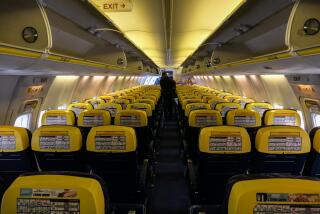Cruise Line Gets Towed Into Court
- Share via
WASHINGTON — Are disabled passengers who board foreign-flagged cruise ships at U.S. ports protected by American laws prohibiting discrimination and unfair treatment?
The justices of the Supreme Court took up that question Monday, and sounded as divided as the lower courts have been.
In 1990, Congress said people with disabilities were entitled to “the full and equal enjoyment of ... places of public accommodation.” This referred to hotels, restaurants and theaters, as well as to a “place of exercise or recreation.”
But the law did not say whether it applied to cruise ships. They are like hotels, complete with several good restaurants, that also offer opportunities for exercise and recreation. However, cruise ships spend much of their time on the high seas, outside the territorial waters of the United States.
In recent years, judges have said the anti-bias law applies to cruise ships operating out of ports in Florida and on the West Coast.
But last year, a U.S. appeals court in New Orleans said the law did not apply to ships traveling on the high seas. It dismissed a discrimination suit against Norwegian Cruise Lines brought by Douglas Spector, a wheelchair-using man who boarded a cruise ship in Houston. Spector said he was treated as a nuisance and was charged more for a handicapped-accessible cabin on the ship’s interior than Norwegian charged for larger cabins with a sea view.
Norwegian Cruise Lines denied overcharging Spector.
Spector also complained that the public restrooms and most of the ship were inaccessible to him and his wheelchair.
The justices heard arguments in Spector vs. Norwegian Cruise Lines to decide an issue that could have a broad reach. The North American cruise industry says it carries 7.1 million passengers a year on 184 ships that operate from U.S. ports.
Lawyers for the cruise lines deny that they discriminate against disabled passengers, but they also argue that they should not be forced to retrofit older ships to fully accommodate passengers who cannot walk. They contend that ocean-going ships should not be forced to abide by U.S. law.
Several justices picked up this theme.
“You are, in effect, saying the U.S. rules the world,” Justice Ruth Bader Ginsburg told Thomas Goldstein, the attorney representing the disabled passenger.
“We are questioning whether Congress intended this,” added Justice Antonin Scalia.
Goldstein said he was not insisting that the older ships be retrofitted. The law calls only for making “reasonable accommodations” to the needs of disabled persons. However, he said, the antidiscrimination law should not permit cruise lines to charge far higher rates for smaller cabins simply because the passengers were disabled.
“This is a situation where millions of Americans are spending billions of dollars on cruise ships,” Goldstein said, and these passengers should not be left without the protections of U.S. law.
A Bush administration lawyer joined the case on the side of the disabled passenger.
“Any vessel that comes into our ... waters is subject to the Americans with Disabilities Act,” said David B. Salmons, an assistant to the U.S. solicitor general.
During the argument, the justices voiced concern over the effect of a ruling that limited the reach of U.S. civil rights laws. If cruise ships were found to be free to discriminate against disabled persons, could they also discriminate against blacks? No sooner had the lawyer for the cruise ship industry stepped to the lectern than he was hit with such a question.
“Are they [cruise ships] free to discriminate based on race or to practice racial segregation?” Ginsburg asked.
When the lawyer dodged the question, Justice Sandra Day O’Connor pressed the point.
“Could the ship engage in racial discrimination in selling its tickets?” she asked.
David Frederick, the Washington lawyer representing the cruise line, said it was not clear whether U.S. civil rights laws extended to foreign ships operating on the high seas.
By the end of the argument, several justices sounded as if they had swung back to the view that U.S. laws must travel the seas.
Worldwide, nearly three-fourths of all cruise ship passengers travel to and from American ports, even though they fly a foreign “flag of convenience,” the lawyers noted. Norwegian Cruise Lines flies the flag of the Bahamas.
The justices will vote on the issue behind closed doors this week and issue a written ruling in several months.
More to Read
Sign up for Essential California
The most important California stories and recommendations in your inbox every morning.
You may occasionally receive promotional content from the Los Angeles Times.














